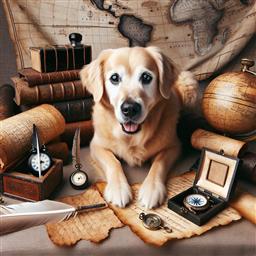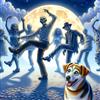1680s Dog Names - Page 4
Updated: July 03, 2024
Welcome to a unique collection of canine appellations that have withstood the test of time. As we delve into the realm of the 17th century, we uncover the rich history and cultural significance of dog names from a bygone era. This period, marked by progress, exploration and enlightenment, heavily influenced the naming conventions of our four-legged companions.
As you browse through this page, you will encounter an array of charming and intriguing names that were popular during this captivating era. These names not only offer a glimpse into the past, but also provide a unique and distinctive option for your beloved pet. The 1680s was a decade of profound change, and these dog names reflect the spirit of the time, embodying resilience, courage, and loyalty.
These names are a testament to the enduring bond between humans and dogs, a bond that transcends time and space. Whether you're a history buff, a dog lover, or both, this distinctive selection of names offers a refreshing departure from the commonplace. So take a journey back in time, and perhaps you'll find the perfect name that reflects the soul and spirit of your canine companion.
| Name | Reason to Choose |
|---|---|
| Parch | Signifies the process of drying food for preservation |
| Parchment | Named after the type of paper used in the era |
| Parson | Reflects the role of clergy in 1680s society |
| Pearl | Symbol of wealth and luxury in the 1680s |
| Penn | Named after William Penn, who founded Pennsylvania in the 1680s |
| Penny | A common currency in the 1680s |
| Pepys | A tribute to Samuel Pepys, an important figure in London during this period |
| Pewter | A metal commonly used for making items in the 1680s |
| Pike | A common weapon used during this era |
| Pilgrim | The term became popular during the Great Migration |
| Piper | Represents the musical instrument popular in the 1680s |
| Pistol | Refers to the firearm which was in common use |
| Plague | Refers to the disease outbreaks of the time |
| Puritan | Signifies the religious group that held a powerful influence in the 1680s |
| Quaker | This reflects the rise of the Quaker movement in the 17th century |
| Quarry | Named after the stone extraction sites of the time |
| Quill | Named after the primary writing tool of the era |
| Quince | A fruit often consumed in the 1680s |
| Reaper | Symbolizes the agricultural equipment of the 1680s |
| Rembrandt | Named after the famous painter in the late 1600s |
| Revolution | Signifies the radical political changes of the period |
| Ripple | Symbolizing the waves made by ships during the era of exploration |
| Roundhead | Named after the Parliamentarian supporters during the English Civil War |
| Ruff | Refers to a distinct fashion accessory of the time |
| Rye | Signifying the grain used for making bread |
| Salem | Named after the Salem witch trials which occurred in the late 1680s |
| Scepter | Symbolizes the royal authority during this time |
| Sceptre | Reflects the symbols of monarchy in the era |
| Serf | Named after the lowest feudal status during this time |
| Shilling | Named after the common currency of the time |
|
Suggest:
|
Submitted!
|
| 1 2 3 4 5 | |
Biblical Names
| Name | Description |
|---|---|
| Aaron | Moses' brother, a significant figure in the Exodus story |
| Abraham | Name of a significant patriarch in the Bible |
| Daniel | A prophet known for his wisdom and his ability to interpret dreams |
| David | King of Israel and ancestor of Jesus, according to the Bible |
| Elijah | A prophet who performed miracles and ascended to heaven in a chariot of fire |
| Elisha | Successor of Elijah, performed many miracles |
| Ezra | A scribe and priest who led the second group of Jews back to Jerusalem from Babylon |
| Gideon | A military leader, judge and prophet in the Book of Judges |
| Habakkuk | A prophet who questioned God's justice |
| Haggai | A prophet who encouraged the people to rebuild the temple |
| Isaac | From the Bible, the son of Abraham |
| Jacob | Son of Isaac, has a leading role in Biblical narratives |
| Job | Symbol of patience and faith in the face of trials |
| Josiah | A king of Judah who implemented religious reforms |
| Malachi | The last of the twelve minor prophets |
| Micah | A prophet who predicted the fall of Jerusalem |
| Moses | Renowned as the lawgiver of Israelites |
| Nahum | A prophet who predicted the fall of Nineveh |
| Nehemiah | A governor of Persian Judea who rebuilt Jerusalem's walls |
| Noah | A righteous man chosen by God to survive the Great Flood |
| Obadiah | A prophet who predicted the downfall of Edom |
| Samson | A judge of Israel known for his extraordinary strength |
| Solomon | The wise and wealthy king, son of David |
| Zechariah | A prophet who encouraged the returned exiles to rebuild the temple |
| Zephaniah | A prophet who warned Jerusalem of future judgement |
|
Suggest:
|
Submitted!
|
Geographical Names
| Name | Description |
|---|---|
| Amazon | The Amazon rainforest was being explored during the 1680s |
| Andes | The Andes mountains were a known geographical feature during the 1680s |
| Athens | Athens was a significant city in the Ottoman Empire during the 1680s |
| Beijing | In the 1680s, Beijing was the capital of the Qing dynasty |
| Berlin | In the 1680s, Berlin was the capital of Prussia |
| Boston | Boston was established in the 1680s and is a major city in the United States |
| Brussels | In the 1680s, Brussels was the capital of the Spanish Netherlands |
| Cairo | In the 1680s, Cairo was an important city in the Ottoman Empire |
| Delhi | The Mughal Empire, with its capital in Delhi, was at its peak in the 1680s |
| Dublin | Dublin was a major city in Ireland during the 1680s |
| Edinburgh | Edinburgh was the capital of Scotland in the 1680s |
| Istanbul | Istanbul was a significant city during the Ottoman Empire |
| Lisbon | Lisbon was the heart of the Portuguese Empire in the 1680s |
| London | The city was a hub of international trade during the 1680s |
| Madrid | Madrid was the capital of the Spanish Empire, which was one of the world's most powerful empires in the 1680s |
| Naples | Naples was part of the Spanish Empire in the 1680s |
| Paris | Paris was the center of culture and fashion in the 1680s |
| Rome | Rome was the center of the Catholic Church in the 1680s |
| Sahara | The Sahara desert was a known geographical feature during the 1680s |
| Savannah | Savannah refers to the savannah biome, which was being explored during the 1680s |
| Seville | Seville was an important city in Spain during the 1680s |
| Tundra | Tundra refers to the tundra biome, which was being explored during the 1680s |
| Venice | Venice was an important center of commerce and art in the 1680s |
| Vienna | Vienna was the capital of the Habsburg Monarchy in the 1680s |
| York | Named after the historic city in Northern England, a significant location during the 1680s |
|
Suggest:
|
Submitted!
|
Literary Names
| Name | Description |
|---|---|
| Baroque | The Baroque period was a time of great literary output during the 1680s |
| Behemoth | A character from 'The History of the Civil Wars of England' by Thomas Hobbes, published in the 1680s |
| Behn | Aphra Behn, a British playwright, was a significant figure in 1680s literature |
| Bunyan | John Bunyan, author of 'The Pilgrim's Progress', was a major literary figure in the 1680s |
| Corneille | Pierre Corneille, a leading French dramatist, was influential during the 1680s |
| Cowley | After Abraham Cowley, an English poet whose essays were popular in the 1680s |
| Donne | John Donne's metaphysical poetry was highly influential in the 1680s |
| Dorset | Charles Sackville, Earl of Dorset, was a famous poet in the 1680s |
| Dryden | John Dryden, an English poet, was very prominent in the 1680s |
| Etheridge | George Etheridge, a renowned playwright of comedies, was popular in the 1680s |
| Fletcher | John Fletcher's plays were popular in 1680s London |
| Herrick | Robert Herrick, an English lyric poet, was a key literary figure in the 1680s |
| Locke | John Locke, an influential philosopher, wrote many significant works during the 1680s |
| Marlowe | Inspired by Christopher Marlowe, an English playwright who influenced many writers of the 1680s |
| Milton | John Milton's work, particularly 'Paradise Lost', was influential in the 1680s |
| Moliere | In honour of Jean-Baptiste Poquelin, known by his stage name Molière, a renowned playwright of the 1680s |
| Paradise | A tribute to 'Paradise Lost', a key piece of 1680s literature |
| Pepys | Samuel Pepys's diary provides a significant account of the 1680s |
| Pilgrim | A nod to 'The Pilgrim's Progress', a significant 1680s literature |
| Quixote | A tribute to 'Don Quixote', a novel that greatly influenced 1680s literature |
| Racine | Jean Racine was a leading dramatist in France during the 1680s |
| Rochester | John Wilmot, 2nd Earl of Rochester, was a notable poet in the 1680s |
| Sedley | Sir Charles Sedley, a prominent playwright, was well-known in the 1680s |
| Sorbiere | Samuel Sorbière, a French author, was active in the 1680s |
| Swift | Named after Jonathan Swift, an influential author during the 1680s |
|
Suggest:
|
Submitted!
|
Royalty Names
| Name | Description |
|---|---|
| Anne | In reference to the future Queen Anne of Great Britain, who was a princess in the 1680s |
| Carlos | Taken from Carlos II, who was the King of Spain in the 1680s |
| Charles | Named after King Charles II of England, who was the monarch during the 1680s |
| Christian | Relates to Christian V, who was the King of Denmark and Norway in the 1680s |
| Christina | A tribute to Christina, Queen of Sweden, who abdicated in the mid 1680s |
| Eleonore | Inspired by Eleonore of Austria, a royal figure during the 1680s |
| Elizabeth | A tribute to Elizabeth Charlotte of the Palatinate, a notable royal figure in the 1680s |
| Ferdinand | Pays homage to Ferdinand III, Holy Roman Emperor in the early 1680s |
| Frederick | Honors Frederick I of Prussia, who began his reign in the late 1680s |
| George | Taken from George William, Duke of Brunswick-Lüneburg, who was a significant figure during the 1680s |
| Henrietta | Reflects the name of Henrietta Anne of England, a Duchess of Orleans in the 1680s |
| Ivan | Relates to Ivan V, co-tsar of Russia during this period |
| James | Drawn from James II, who was the King of England at the start of the 1680s |
| John | A nod to John III Sobieski, a notable King of Poland during the 1680s |
| Joseph | This name honors Joseph I, Holy Roman Emperor, who was born in the late 1680s |
| Leopold | Reflects the name of Leopold I, Holy Roman Emperor during the 1680s |
| Louis | This name honors Louis XIV, the Sun King of France during the 1680s |
| Margaret | Inspired by Margaret Teresa of Spain, a royal figure in the 1680s |
| Maria | A tribute to Maria Theresa of Spain, the Queen of France in the 1680s |
| Maria | A tribute to Maria Theresa of Spain, the Queen of France in the 1680s |
| Peter | Honors Peter I of Russia, who began his reign in the late 1680s |
| Philip | Pays homage to Philip Prospero, Prince of Asturias in the early 1680s |
| Sofia | A nod to Sofia Alekseyevna who ruled Russia as regent during the 1680s |
| Victor | In reference to Victor Amadeus II, Duke of Savoy during the 1680s |
| William | Taken from William III of Orange, who became the King of England in 1689 |
|
Suggest:
|
Submitted!
|
Historical Figures Names
| Name | Description |
|---|---|
| Bach | Johann Sebastian Bach, a German composer and musician of the Baroque period |
| Bunyan | John Bunyan, an English writer and Puritan preacher |
| Defoe | Daniel Defoe, an English trader, writer, journalist, pamphleteer and spy |
| Descartes | René Descartes, a French philosopher, mathematician, and scientist |
| Dryden | John Dryden was England's first Poet Laureate in 1668 |
| Halley | Edmond Halley, an English astronomer, geophysicist, mathematician, meteorologist, and physicist |
| Handel | George Frideric Handel, a German-English composer of the Baroque era |
| Hooke | Robert Hooke, a key English scientist and architect |
| Huygens | Christiaan Huygens, a Dutch physicist, mathematician, astronomer and inventor |
| Leibniz | Gottfried Wilhelm Leibniz made significant contributions to philosophy and mathematics in the 1680s |
| Locke | John Locke was a renowned English philosopher and physician |
| Milton | John Milton, an English poet and intellectual |
| Moliere | Molière was a French playwright and actor |
| Newton | After Sir Isaac Newton, a prominent figure during the 1680s |
| Pascal | Blaise Pascal, a French mathematician, physicist, inventor, writer and Catholic theologian |
| Pepys | Samuel Pepys, an English naval administrator and Member of Parliament |
| Purcell | Henry Purcell was a famous English composer |
| Racine | Jean Racine, a prominent French dramatist |
| Rembrandt | Rembrandt Harmenszoon van Rijn, a Dutch draughtsman, painter, and printmaker |
| Rubens | Peter Paul Rubens, a Flemish artist and diplomat from the Dutch Golden Age |
| Spinoza | Baruch Spinoza was an influential philosopher in the 1680s |
| Swift | Jonathan Swift, an Anglo-Irish satirist, essayist, and political pamphleteer |
| Vermeer | Johannes Vermeer, a Dutch Baroque Period painter |
| Vivaldi | Antonio Vivaldi, an Italian Baroque musical composer, virtuoso violinist, teacher, impresario, and Roman Catholic priest |
| Wren | Christopher Wren, a famous English architect |
|
Suggest:
|
Submitted!
|
User Submitted Images
There are currently no user submitted images for this page. This is your opportunity to be the first! Submit your photo below.
User Recommendations
There are currently no name recommendations for this page. This is your opportunity to be the first! Make your recommendation below.
Recently Updated
We would like to take this time to thank all of our visitors that make DogNamed.com the best dog naming resource on the web. Our site would not be where it is today without your suggestions, ratings, and photo submissions. So pat yourselves on the back for a job well done and keep up the good work! If you have any comments, suggestions, or ideas for the this page or any part of our site, don't hesitate to drop us a line on our Contact Page. Thank you! -The DogNamed Team




























